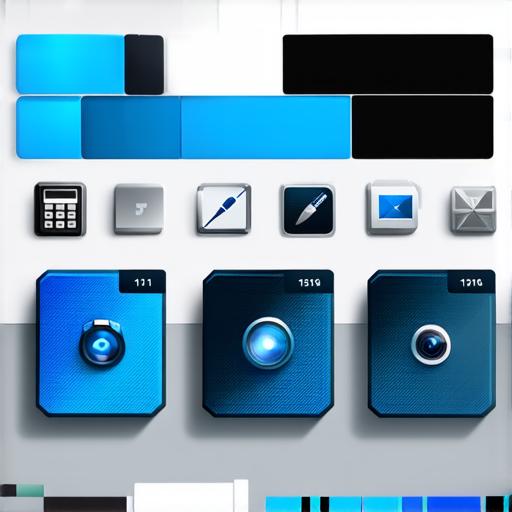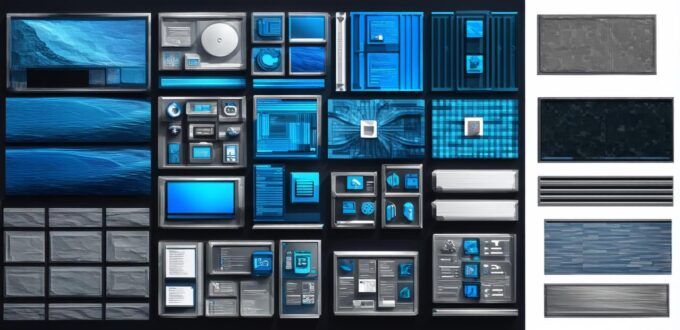As software developers, we spend most of our time working with different types of software found on computers. In this article, we will explore ten different kinds of software that you might find on your computer, along with their functions and benefits. We will also discuss the importance of having a variety of software tools at our disposal and how they can enhance our productivity and efficiency.
1. Operating System Software
Operating system (OS) software is the foundation upon which all other applications run. It manages computer resources, such as memory, storage, and processing power, and provides a way for users to interact with the hardware. Examples of operating systems include Windows, macOS, and Linux.
2. Productivity Software
Productivity software includes tools used for creating and editing documents, spreadsheets, presentations, and other types of content. Microsoft Office is one of the most popular productivity suites, but there are many other options available, such as Google Docs and LibreOffice.
3. Creative Software
Creative software includes tools used for creating graphics, videos, music, and other forms of digital art. Examples include Adobe Photoshop, Illustrator, and Premiere Pro, as well as free alternatives like GIMP, Inkscape, and Audacity.
4. Communication Software
Communication software includes tools used for sending and receiving email, instant messaging, video conferencing, and social media. Examples include Outlook, Gmail, Slack, and Zoom.
5. Collaboration Software
Collaboration software includes tools used for working together with others on projects and tasks. Examples include Asana, Trello, and Microsoft Teams.
6. Security Software
Security software includes tools used to protect your computer from malware, viruses, and other types of cyber threats. Examples include Norton, McAfee, and Bitdefender.
7. Multimedia Software
Multimedia software includes tools used for creating and editing videos, audio files, and other forms of media content. Examples include iMovie, Final Cut Pro, and Audacity.
8. Utilities Software
Utilities software includes tools used for managing and maintaining your computer’s hardware and software. Examples include CCleaner, Disk Cleanup, and Malwarebytes.
9. Gaming Software
Gaming software includes tools used for playing video games on your computer. Examples include Steam, Epic Games, and Origin.
10. Educational Software
Educational software includes tools used for learning new skills and knowledge. Examples include Coursera, Udemy, and Khan Academy.
Why Having a Variety of Software Tools Matters?
Having a variety of software tools at our disposal is essential for staying productive and efficient as software developers. Each tool serves a specific purpose and can help us accomplish tasks more quickly and accurately.
Case Studies: How Different Kinds of Software Have Helped Developers
Let’s take a look at some real-life examples of how different kinds of software have helped developers in their work.
1. Productivity Software:
A developer working on a complex project might use Microsoft Office to create and edit documents, spreadsheets, and presentations to communicate effectively with clients and team members. They might also use productivity software like Trello or Asana to keep track of tasks and deadlines.
2. Creative Software:
A graphic designer might use Adobe Photoshop to create high-quality images and designs for a website or advertising campaign. They might also use creative software like Audacity to create custom audio effects and soundscapes.
3. Communication Software:
A developer working remotely might use Slack to communicate with their team members in real-time, share files and updates, and stay organized. They might also use video conferencing software like Zoom to have face-to-face meetings with clients or team members.
4. Collaboration Software:
A development team working on a large-scale project might use Asana to manage tasks and deadlines, track progress, and communicate effectively with each other. They might also use collaboration software like Google Docs to work together on documents and presentations.
5. Security Software:
A developer working on a sensitive project might use security software like Norton or McAfee to protect their computer from malware and viruses. They might also use encryption software to keep their data secure and confidential.
6. Multimedia Software:
A video game developer might use iMovie or Final Cut Pro to create promotional trailers for their games. They might also use multimedia software like Audacity to create custom audio effects and soundscapes.
7. Utilities Software:
A developer working on a computer with limited resources might use utilities software like CCleaner to free up disk space and improve performance. They might also use software like Malwarebytes to scan for and remove malware and viruses.
8. Gaming Software:
A developer working on a game that runs on multiple platforms might use gaming software like Steam or Epic Games to distribute their game to players. They might also use gaming software like Unity or Unreal Engine to create the game’s graphics and animations.
9. Educational Software:
A developer working on an educational app might use educational software like Coursera or Udemy to learn new skills and stay up-to-date with the latest technologies and trends in the field. They might also use educational software like Khan Academy to teach others about programming and software development.
10. Personal Software:
A developer working on a personal project might use personal software like iTunes or Spotify to manage their music library, or Photoshop or Lightroom to edit their photos. They might also use personal software like Evernote or Trello to keep track of their tasks and ideas.
FAQs
1. What is the difference between productivity software and creative software?
Productivity software is used for creating and editing documents, spreadsheets, presentations, and other types of content, while creative software is used for creating graphics, videos, music, and other forms of digital art.
2. Why do I need communication software as a developer?
Communication software allows you to stay organized and connected with your team members, clients, and stakeholders in real-time. It can also help you share files and updates more efficiently, and keep track of tasks and deadlines.
3. What is the purpose of educational software for developers?
Educational software can help developers learn new skills and stay up-to-date with the latest technologies and trends in the field. It can also provide a fun way to unwind after a long day of work.
4. What are some examples of utilities software that developers might use?
Examples of utilities software that developers might use include CCleaner, Malwarebytes, Disk Cleanup, and System Restore.
5. What is the difference between gaming software and educational software for developers?
Gaming software is used to distribute games to players, while educational software is used to learn new skills and stay up-to-date with the latest technologies and trends in the field.

